Sign up. Be inspired. Get clicking.
How to use "planet-supportive" filters effectively on booking platforms
In the quest for a planet-conscious lifestyle, a realm of tailored possibilities unfolds on booking platforms, where advanced filters align precisely with our sustainable preferences. This strategic approach not only saves time but also champions environmental stewardship. By enabling platforms like Booking.com and Hostelworld to pinpoint conscientious, low-impact activities, travelers can seamlessly craft journeys that honor nature and bolster vibrant local communities. According to National Geographic Traveler, sustainable travel aims to minimize harm to the environment and local communities while maximizing positive impacts.
Filters for verdant accommodations
"Planet-friendly" filters on booking platforms help travelers find verdant accommodations, marking a significant step toward responsible tourism.
- More travelers are becoming environmentally conscious, increasing the popularity of low-impact lodging
- "Planet-supportive" filters simplify finding environmentally responsible accommodations
- The shift toward sustainable travel is a major step for responsible tourism
- Travelers can easily reduce their environmental impact on the road
- Using "planet-supportive" filters encourages environmentally responsible travel
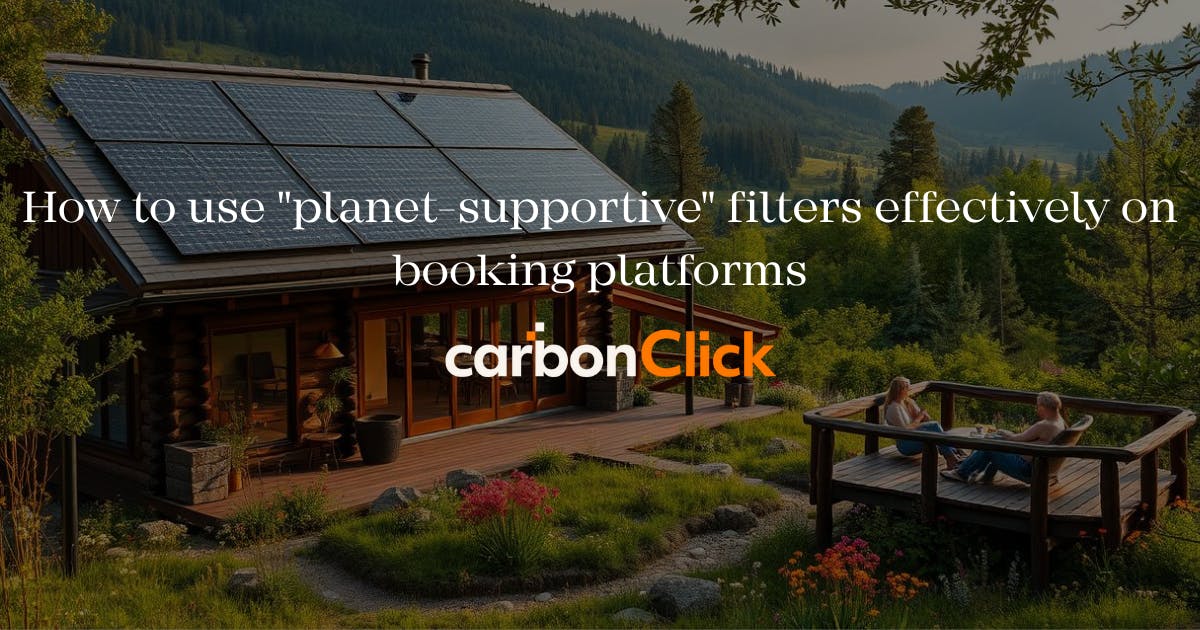
What is sustainable accommodation?
With eco-tourism on the rise, understanding sustainable accommodation is crucial for travelers and hoteliers. The hospitality industry significantly contributes to global carbon emissions, underscoring the importance of choosing accommodations carefully to protect the environment.
What is a place to stay that is good for the environment?
Sustainable accommodation minimizes environmental impact, encompassing verdant hotels, resorts, and vacation rentals. These accommodations use energy-efficient lighting, reduce waste, and source materials responsibly, which lowers carbon footprints while providing unique and responsible travel experiences.
Why it’s important to make low-impact travel choices
Choosing low-impact accommodations is the best way to reduce tourism’s environmental impact, as the hospitality industry generates significant carbon emissions. Sustainable stays also support local communities and preserve cultural heritage.
- Verdant accommodations use less energy and emit fewer greenhouse gases
- They implement waste reduction and recycling programs, benefiting the environment
- Sustainable lodging supports local economies by sourcing goods and services locally
Travellers can promote sustainable tourism by choosing sustainable accommodations, which enhance their travel experience while encouraging responsible, authentic tourism.
Well-known booking sites with verdant filters
As sustainable travel grows, major booking platforms have introduced filters for sustainable options, making it easier for conscientious travellers to find green accommodations.
Airbnb
Airbnb allows users to search for sustainable accommodations, including properties and hosts committed to sustainable practices.
- Airbnb features a special label for conscientious stays
- Users can filter searches by environmental factors
Booking.com
Booking.com’s "Sustainable Travel" feature helps users identify low-impact accommodations, with the Green Key ecological-label verifying authenticity.
- The platform lists properties employing verdant methods
Expedia
Expedia’s "Sustainable Options" filter enables travelers to find hotels and accommodations recognized for sustainable practices, verified by external auditors.
- A special badge highlights Expedia’s environmentally conscious options
- The platform collaborates with auditors to ensure listed properties are sustainable
These booking platforms lead in verdant travel, offering travellers more sustainable accommodation choices.
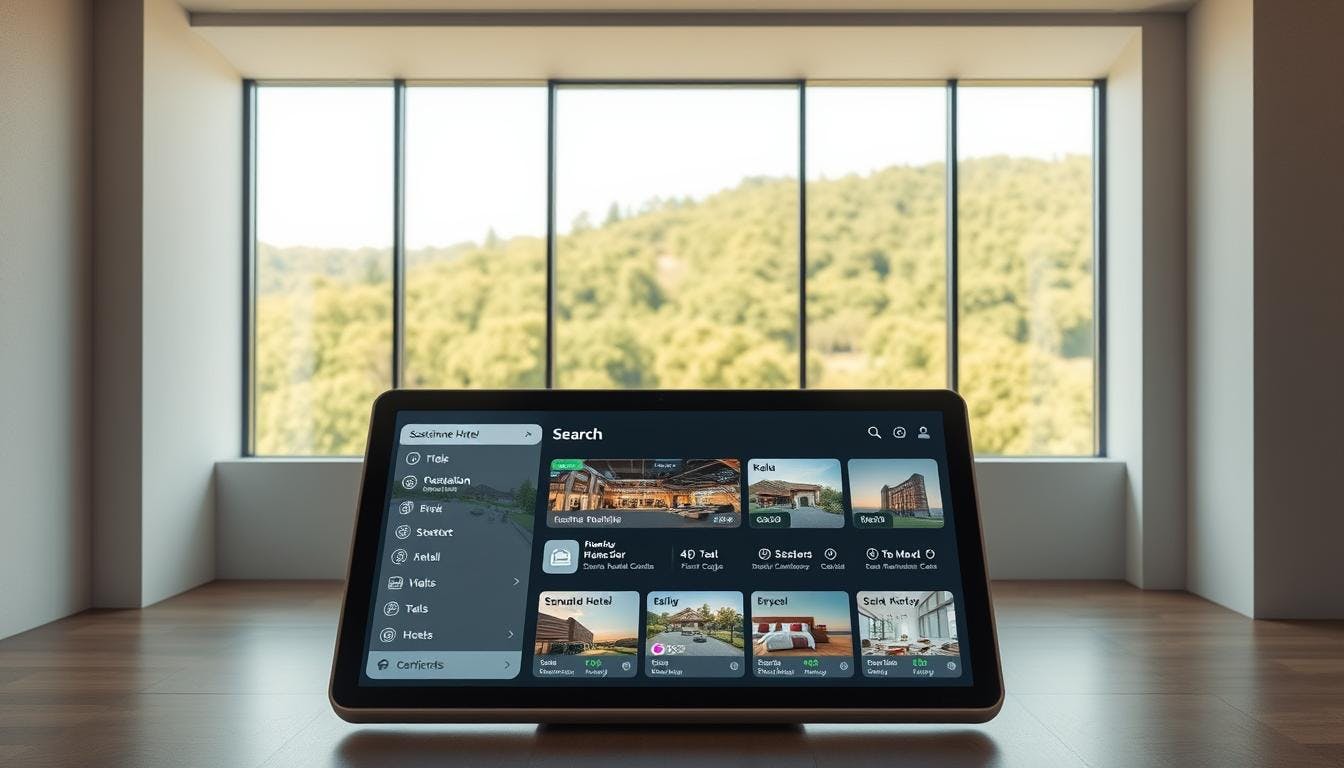

How to use verdant filters on booking sites
Sustainable filters on popular booking platforms simplify finding verdant accommodations, enabling quicker, greener choices.
How to use filters in steps
To maximize sustainable accommodation filters, follow these steps:
- Visit your preferred booking platform, such as Airbnb, Booking.com, or Expedia
- Locate the search or filter section, typically labeled "Filters" or indicated by an icon
- Look for verdant, green certifications, or sustainability options
- Apply filters matching your preferences, such as energy-efficient homes or waste-reducing hotels
- Combine sustainable filters with preferences like budget or location for a tailored search
How to make your search better
To optimize sustainable filters, consider these tips:
- Be specific with filters to obtain relevant results
- Seek eco-certifications like LEED or Green Key when available
- Read traveler reviews to verify accommodations’ sustainability claims
- Combine sustainable filters with preferences like budget or amenities for the best match
Following these steps and tips ensures effective use of sustainable filters, helping travelers find ecologically compatible accommodations that align with their needs.
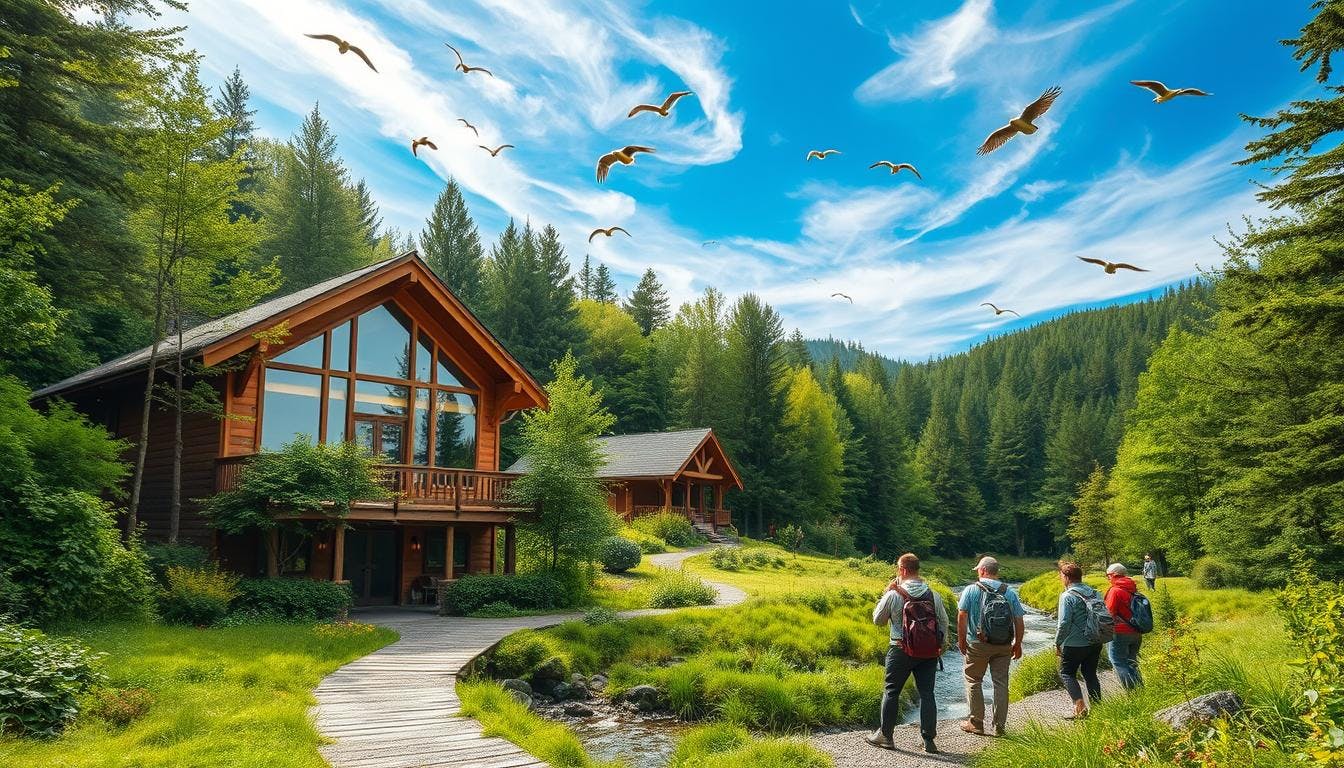
Advantages of choosing sustainable places to stay
Sustainable accommodations benefit the environment and local communities, allowing travelers to positively impact their destinations.
Impact on the environment
Verdant accommodations significantly reduce a trip’s environmental impact through water-saving measures, energy-efficient lighting, and waste reduction, preserving natural resources for future generations.
Helping out local communities
Sustainable accommodations support local communities by sourcing goods and services locally, boosting the economy and preserving cultural traditions. Staying at locally owned properties allows travelers to experience authentic culture.
Good for your health and well-being
Verdant hotels prioritize guest health using safe, natural materials, improving indoor air quality, and offering healthy food, enhancing relaxation and well-being.
Things people get wrong about sustainable lodging
Many believe verdant lodging is too expensive or hard to find, but numerous affordable and accessible options exist.
Concerns about cost
A common misconception is that verdant hotels are pricier than regular ones. While some luxury low-impact lodges may cost more, many are competitively priced.
- Many conscientious accommodations offer competitive prices
- Booking platforms allow filtering for cost effective low-impact options
- Choosing verdant lodging can lead to long-term savings
Problems with availability
Some think low-impact accommodations are scarce, but increasing demand has expanded their availability across major booking platforms.
- Most platforms feature dedicated filters for verdant stays
- More hotels and lodges adopt environmentally compatible practices
- Eco-friendly options are available in both urban and natural settings
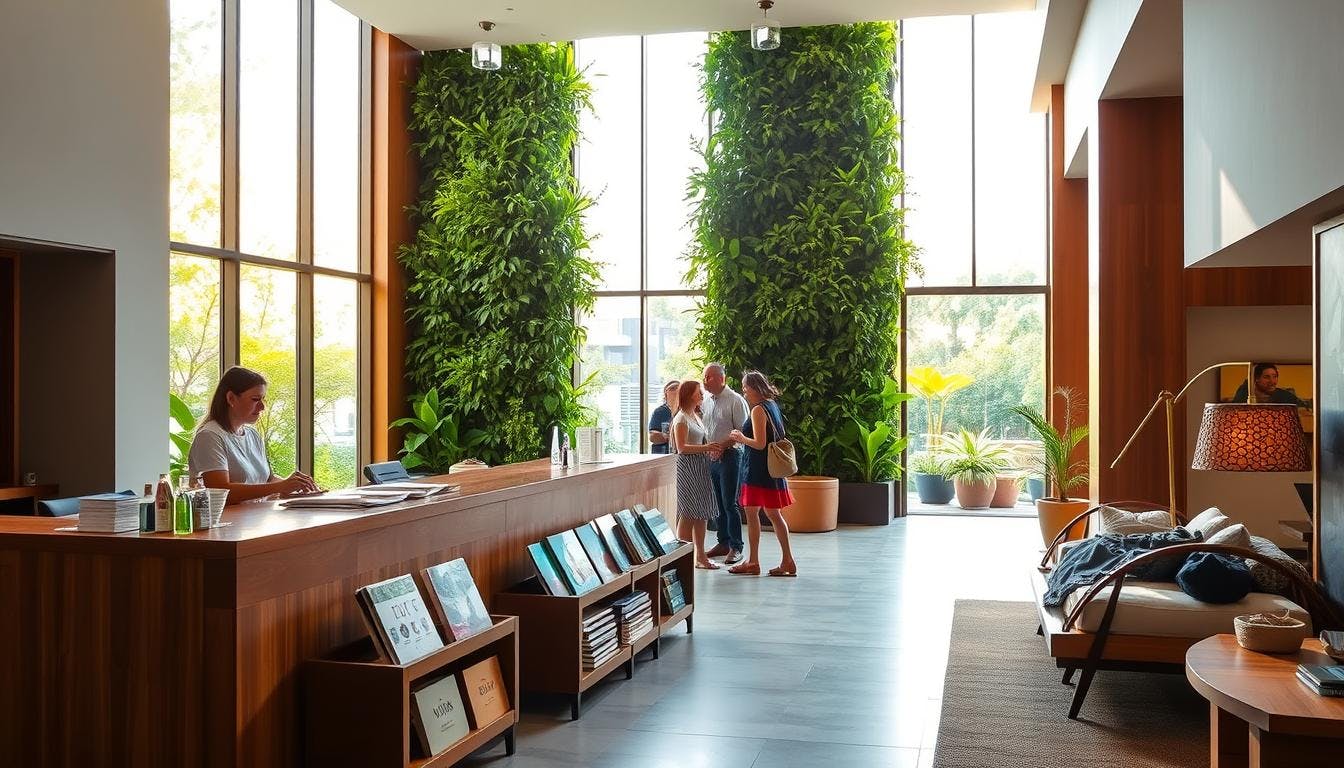
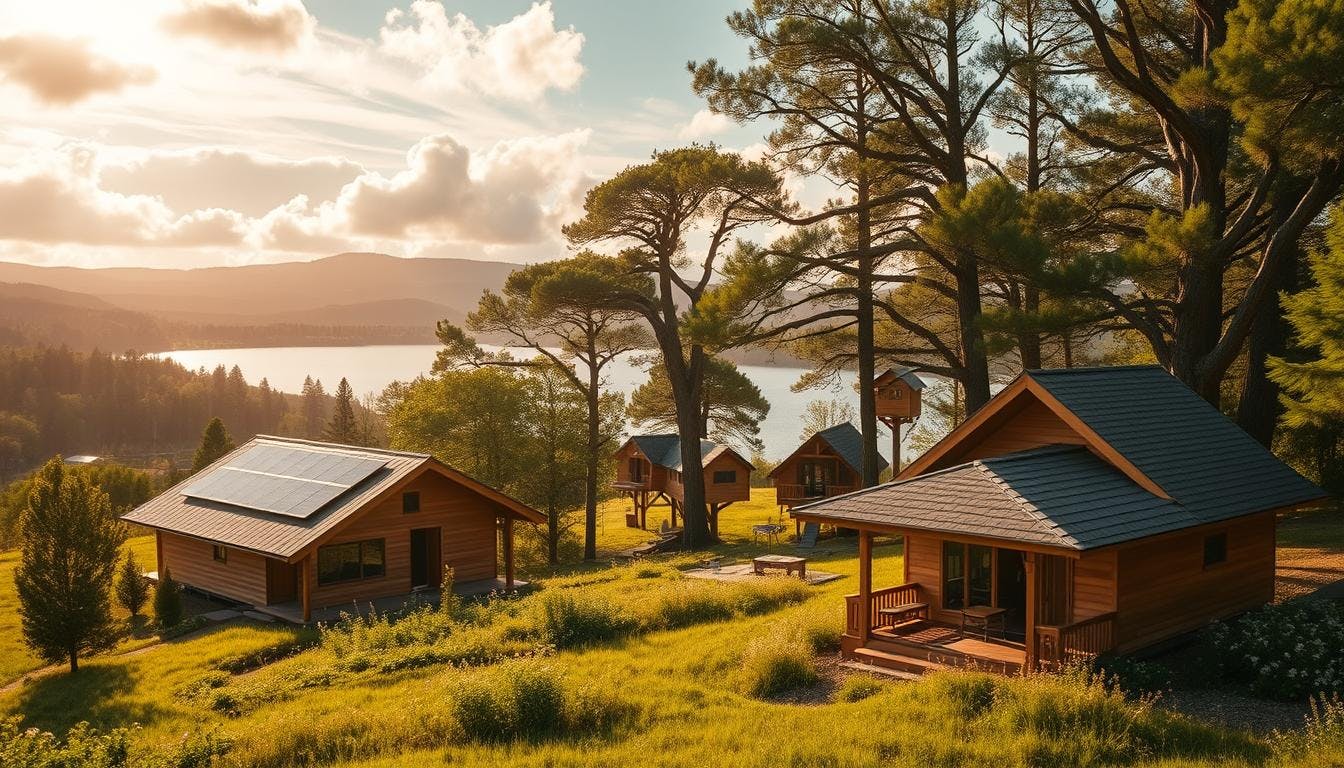
Important things about verdant places to stay
Sustainable accommodations stand out for their minimal environmental impact and enhanced guest experiences, employing various strategies to reduce carbon footprints while offering unique stays.
Efficiency of energy
Energy efficiency is a cornerstone of sustainable accommodations, utilizing smart thermostats, LED lighting, and energy-saving appliances. Many verdant hotels harness renewable energy like wind and solar, reducing reliance on fossil fuels.
Ways to cut down on waste
Waste reduction is critical for eco-friendly accommodations, which recycle, minimize single-use plastics, and compost food scraps. Some collaborate with local groups to donate excess food and supplies, reducing waste and benefiting communities.
Involvement of the community
Community engagement is vital for sustainable accommodations, supporting local businesses, participating in community projects, and honoring cultural heritage. This fosters authentic guest experiences and strengthens local economies.
Sustainable accommodations prioritize energy efficiency, waste reduction, and community involvement, aligning with travelers’ environmental values and promoting a sustainable hospitality industry.
Recognising labels and ecological-certifications
Understanding eco-certifications and labels is essential when seeking sustainable accommodations, as they identify properties employing sustainable practices to reduce environmental impact. These certifications also help to unmask greenwashing while making reservations for tourism.
Leed certification
The LEED (Leadership in Energy and Environmental Design) Certification is a renowned standard for environmentally compatible buildings, evaluating energy use, water conservation, and air quality. LEED-certified properties demonstrate a strong commitment to environmental protection.
Green key
Green Key is a key eco-label recognizing businesses for their environmental efforts, assessing energy and water use, waste management, and staff involvement in sustainability. Green Key properties show genuine environmental dedication.
- Less environmental harm
- Support for local communities
- Healthier and happier guest experiences
Choosing sustainable accommodations helps travelers support sustainable tourism, ensuring alignment with their environmental values.
The importance of reviews in finding low-impact stays
Reviews are crucial for identifying genuinely ecologically supportive accommodations, offering insights beyond promotional claims to verify a hotel’s sustainability.
Realness in guest feedback
Guest reviews provide a glimpse into a hotel’s true practices, focusing on:
- Specific details about eco-friendly practices, like waste reduction or energy-efficient lighting
- Discussions of community involvement or support for local businesses
- Opinions on the hotel’s environmental policies and their implementation
How reviews affect sustainable choices
Reviews guide travelers’ decisions and motivate hotels to maintain or improve their conscientious efforts. Positive feedback reinforces sustainable practices, while negative feedback encourages improvement. Consistent positive reviews about a hotel’s verdant practices indicate genuine commitment
Combining sustainable filters with other choices
Travellers can combine low-impact accommodation filters with other preferences to find ideal stays, balancing sustainability with other priorities.
Things to think about when it comes to your budget
Budget is a key concern for travellers. Combining low-impact filters with price range options on booking platforms helps find affordable, sustainable accommodations, such as those with energy-efficient practices or low-impact amenities.
Location and amenities
Location and amenities are critical when choosing accommodations. Travellers can prioritize sustainability while filtering for amenities like free breakfast or fitness centres, or select sustainable lodges in natural settings or sustainable urban hotels.
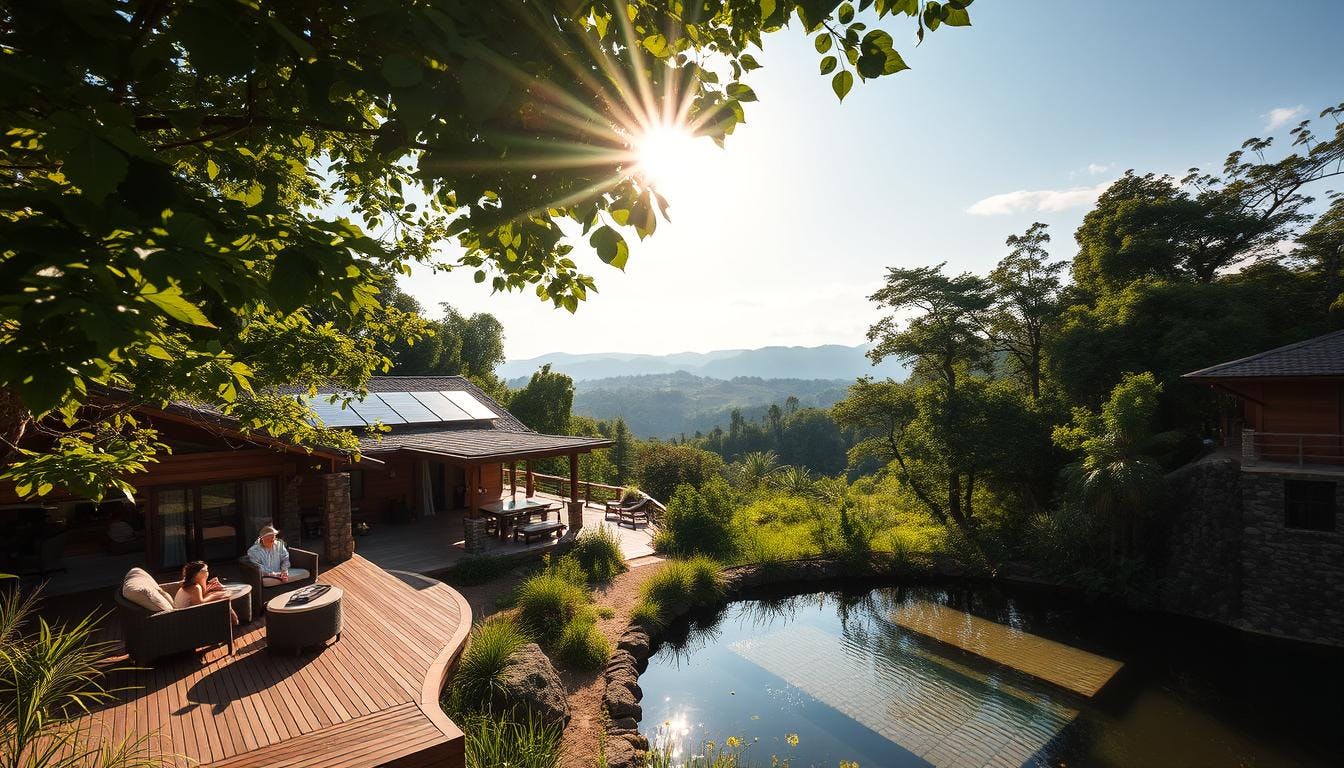
Problems with finding sustainable choices
Finding low-impact accommodations can be challenging, presenting obstacles for travellers seeking sustainable options. Yet, this pursuit is vital for preserving fragile ecosystems and fostering conscientious journeys.
Not available in all areas
Verdant hotels are scarce in some regions, with popular destinations offering more verdant options than less-visited areas.
- Limited sustainable properties in some areas
- Insufficient information about low-impact accommodations
- Fewer choices for environmentally conscious travelers
Finding a balance between comfort and sustainability
Balancing low-impact practices with comfort is challenging, as travellers may need to sacrifice some luxuries for sustainability.
- Weighing the pros and cons of verdant versus luxurious options
- Understanding the true cost of verdant accommodations
- Exploring options that balance comfort and environmental responsibility
What will happen in the future of verdant travel
Environmentally conscious travelers are reshaping the industry, driving demand for non-harmful travel options and transforming global travel perspectives.
More and more people want low-impact options
Growing environmental awareness fuels demand for verdant accommodations, reflected in travelers’ choices.
- Increased use of verdant hotel filters on booking platforms
- Rising demand for ecologically certified accommodations
- Greater interest in locally sourced, environmentally compatible amenities
Technological progress helping sustainability
Technology significantly enhances sustainable travel, simplifying sustainable choices.
- Developing apps to locate nature-based accommodations
- Using AI to optimize hotel energy use
- Employing blockchain for transparent sustainable practices
The travel industry is evolving, with eco-friendly travel becoming the norm, driven by technological advancements and growing demand for sustainable options.

Conclusion: choosing the right travel options
Making informed travel choices significantly impacts the environment and local communities. Choosing verdant accommodations promotes a more sustainable tourism industry.
Important points
Careful accommodation choices are key to environmentally responsible travel. Platforms like Airbnb, Booking.com, and Expedia offer verdant search filters. Understanding sustainable accommodation features, such as energy efficiency and waste reduction, is essential.
Being a responsible traveler
Travelers can promote sustainable accommodations by combining verdant filters with preferences like price and amenities, finding stays that support local communities. Prioritizing verdant accommodations ensures travel choices align with sustainable values.
17 South Street
Auckland 1010
New Zealand
info@carbonclick.com- -
- X
Subscribe now to stay up to date with CarbonClick, carbon offsetting and climate action.
By signing up you agree to our Privacy Policy.


